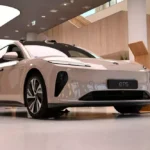A recent dispute in China has sparked a wave of fierce debates on social media.
On December 11th, a man named Zhao, who owns an apartment in Zhejiang, China, purchased three parking spots in his residential complex.
However, as he did not own a car, all three parking spaces remained empty and were often occupied by other vehicles, despite his efforts to secure them with locks and notices indicating private ownership. Frustrated, Zhao decided to place his son’s toy cars in the spots.
What Zhao didn’t anticipate was the reaction of the parking lot management staff. They destroyed the toy cars, citing potential fire hazards as the reason for their actions.
Angered by this, Zhao demanded compensation from the management for the destruction of his property, amounting to 60,000 yuan (approximately 207.67 million VND). Zhao argued that his actions were justified as he had witnessed bicycles, electric scooters, and three-wheeled vehicles occupying car parking spots in the past.
The incident, shared on social media, sparked a flurry of debates. While some opposed Zhao’s actions, others believed the management was at fault.
According to NetEase and Sohu, although using toy cars as placeholders may not be the most appropriate solution due to potential fire hazards, Zhao was within his rights to protect his legally acquired parking spaces from being occupied by others. The management, on the other hand, has a responsibility to manage the facility and protect the legitimate rights and interests of the residents.
The management’s unilateral decision to destroy Zhao’s son’s toy cars without his consent could be considered a violation of property rights, and they may be held liable for corresponding compensation. The amount of compensation would be determined based on the value of the destroyed items. However, if the requested compensation amount is excessively high and exceeds the actual damage, Zhao’s claim may be deemed unreasonable.
TH (Tuoitrethudo)















































